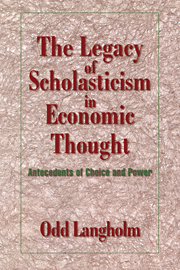Book contents
- Frontmatter
- Contents
- Preface
- Introduction
- I COMPULSION AND THE WILL: THREE ANCIENT TRADITIONS
- II NEED AS COMPULSION: THE SCHOLASTIC PARADIGM
- III REJECTION AND REVIVAL IN POSTSCHOLASTIC THOUGHT
- 8 Hobbes: the antithesis
- 9 The economics of natural law
- 10 The neoclassical system and its critics
- Bibliography
- Index
10 - The neoclassical system and its critics
Published online by Cambridge University Press: 13 March 2010
- Frontmatter
- Contents
- Preface
- Introduction
- I COMPULSION AND THE WILL: THREE ANCIENT TRADITIONS
- II NEED AS COMPULSION: THE SCHOLASTIC PARADIGM
- III REJECTION AND REVIVAL IN POSTSCHOLASTIC THOUGHT
- 8 Hobbes: the antithesis
- 9 The economics of natural law
- 10 The neoclassical system and its critics
- Bibliography
- Index
Summary
The case of labor
In a recent critical assessment of the classical system, one of its most prominent features is derived from the Hobbesian conception of justice. By the classical system, I mean both the original set of models developed from Smith to J. S. Mill and the neoclassical reconstruction of which Alfred Marshall is usually considered to be the main architect (by reconciling the elder system with the marginal approach), though, in a narrower sense, it is sometimes reserved for post-Keynesian developments. A society embracing a jurisprudential theory according to which injustice “is no other than the nonperformance of Covenant” provides a “facilitative form” of law. Such is the assumption of classical economics. The law is limited to adjudicating disputes arising in the private sector. The state provides a neutral, impartial framework. It does not intervene by engaging in “social engineering,” that is, in ordering society by legislative action. This is the laissez-faire interpretation of Hobbes encountered in Chapter 8. In the economic sphere, the law permits economic actors to make their own contracts and restricts itself to ensuring that they are kept according to their terms properly interpreted. In addition, the classical system assumes markets to be perfectly competitive so that neither party to a contract has power over the other. Facilitative law and perfect competition ensure “voluntariness” in economic life. In such a system, Galbraith observes, there “could be no misuse of private power because no one had power to misuse.”
- Type
- Chapter
- Information
- The Legacy of Scholasticism in Economic ThoughtAntecedents of Choice and Power, pp. 178 - 200Publisher: Cambridge University PressPrint publication year: 1998

